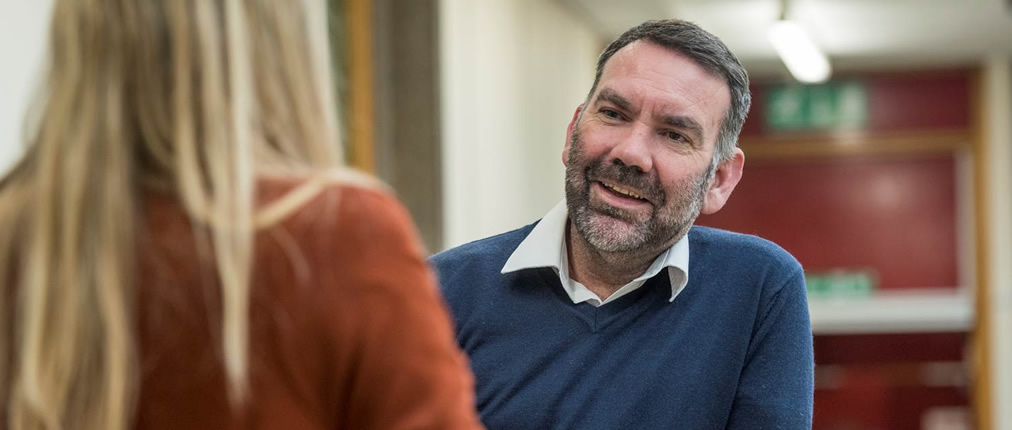Hartley News Online Your alumni and supporter magazine
Dr Nick Maguire, Associate Professor in Clinical Psychology, talks about the steps being taken to promote inclusion and equality in Psychology, his own changing work-life commitments and how a more mindful approach to leadership can benefit staff at all levels.
How did your career with the University begin?
I have a longstanding connection with Southampton having completed my undergraduate degree here – I graduated in 1995 with a BSc Psychology. I then spent a year in the NHS as an assistant psychologist and came back to do my doctoral training in clinical psychology here. After that I had several clinical and research roles, including working in a community mental health team, with homelessness charities and on a psychological treatment trial. I came back to the University again on a part-time basis in 2003 and full time in 2006.
What are your research interests and responsibilities?
My main research areas are organisational wellbeing and mental health issues in relation to excluded populations – particularly homeless people and rough sleepers. I also teach and I’m Director of Programmes, which means I have oversight of the department’s educational portfolio.
What’s your involvement with Psychology’s equality and diversity initiatives?
I co-chair the department’s Athena SWAN committee. Being caused to pay attention to areas where we may be discriminating in organisational ways has been an eye-opening process.
The discrimination is in the main unconscious and unintended, but some ways of working can result in certain groups of people being impeded in terms of their progression.
What impact has the Athena SWAN process had so far?
We’ve made changes in a number of areas. Some are gender-specific – for example, thinking about what women need in order to re-establish their research programmes when they return from maternity leave. But some changes, such as the core hours policy, benefit wider groups. By ensuring that key activities such as departmental meetings take place within certain times, we’re less likely to put people who work part time at a disadvantage.
Have changes in the University’s culture affected your own working life?
Organisationally, I think it has become much more acceptable to talk about work-life balance. The narratives that equate the number of hours you put in with your value to the organisation are starting to be questioned. It’s more about work output and outcomes, which for many, means that they can choose to organise themselves in a way that suits them. For others with less autonomy over hours worked, it remains important to ensure that beliefs about having to work long hours are checked.
This has benefited my family as we have adopted two children in recent years. The University has a voluntary two-week paternity leave allowance, so I took my two weeks, which was extremely helpful. I had to take some annual leave also, and there were no blocks or barriers from the organisation. But having a family meant my priorities had to change. I wasn’t able to – and didn’t want to – do the same long hours, so my work patterns have shifted.
Have you noticed any other organisational changes during your time at Southampton?
Traditionally, research has been perceived as the most ‘valuable’ activity within universities. Here I think that’s slowly starting to change at the top level; we’re realising that education, enterprise and other professional responsibilities are extremely valuable and entirely necessary. This was formalised and built into the review of the progression and promotion policies.
You received a Vice-Chancellor’s Award last year for your work on leadership – how does this link with equality and inclusion issues?
The award was for my contribution to a leadership course for senior management. I see leadership as something that everybody does every day. The higher up you are the more people your decisions affect and the more critical the decisions to the organisation, but staff at all levels make decisions and lead processes or people. I deliver workshops and teaching sessions on a psychological approach to leadership and management, which enable managers to consider how leaders with a developed ability to reflect on their decisions and behaviour can be more effective. It’s about asking: What do I expect to change as a result of the particular behaviour I’m engaging in, and am I doing it to benefit myself or to benefit the organisation?
This is intrinsically linked with wellbeing and inclusion, because it encourages leaders to be mindful of the effect of their behaviour on others, including those who may be unconsciously marginalised by the organisation in some way. This can contribute to an environment in which staff feel valued and are therefore more productive in their jobs and, most importantly, happier.
